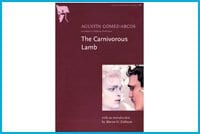If you think Pedro Almodóvar is the apotheosis of Spain’s arty queer set, give this stirring 1975 novel a whirl. It reads like the satirical subtext (the more ruthless truth about mothers, boys, priests) that Almodóvar never quite allows to surface in his films.
The Carnivorous Lamb is part of Arsenal Pulp Press’s Little Sister’s Classics series of neglected and out-of-print queer fiction, the first in the series not penned originally in English (translated by William Rodarmor).
Augustín Gómez-Arcos, who died in 1998, was a prize-winning Spanish playwright, novelist and anarchist who exiled himself to France in order to safely pursue his lifelong double-edged vocation: merciless satire directed at the Fascist government of his homeland and candid exploration of queer love besieged by moral dogma. Both obsessions join in this book, focused expertly through the lens of brother love and family dysfunction.
The story of childhood passion is told in a book-length flashback bookended by Ignacio’s present as he sits alone in his empty family house awaiting his older brother’s return after seven years. Now twentysomething, he’s still at the mercy of intense reminiscence: nights of carnal delight with Antonio.
A magic-realist spin gives Ignacio’s memories a dreamlike quality. As his mother constructs her “universe of hate” around him, the family home takes on a corpse-like look of rot: “a greenish ooze was always running down the walls.” The brothers’ bedroom is the only one spared the general decay, as if the pure sibling love is a talisman against a corrupt world.
This is the 1940s. Spain is still bleeding from the Spanish Civil War and firmly under the yoke of Franco’s fascist dictatorship. Though the family are not churchgoers, their Catholic heritage ensures the house is filled with religious images. To young Ignacio one painting seems especially linked to the perils of homo desire. “A child, blond like me, standing heedless at the edge of a cliff, miraculously held up by the wings of his guardian angel, while… a reddish, bloody chasm yawned far below.” Against such horrors, Clara, a live-in servant, becomes Ignacio’s sole source of nurturing affection.
Despite the family tensions, a vicarious eroticism infuses the household. Ignacio might at any time appear before Clara or his mother stark naked, with no reprimands ensuing. The boys sometimes have boisterous sex with their bedroom door open. When it’s decided (in a belated burst of Catholic propriety) that Ignacio must be baptized Father Gonzalo arrives and performs the ritual over a naked lad who’s showing the first bloom of pubic hair. The scene has a delicious sexy-farcical edge to it. Weeks later, as Ignacio kneels before Gonzalo in an impromptu confessional, the farce shifts from Ignacio’s mocking of Gonzalo’s hard-on (“It’s right under my nose, and it smells bad”) to the priest’s leading questions about communist sympathies in the family. Franco’s spies, it seems, are everywhere.
Volcanic lust increasingly binds Antonio and Ignacio. Their climactic tryst in the balmy waters of a hidden spring leaps from gauzy romance to an ecstasy that’s half agony. A sort of rape has occurred, but for Ignacio it only enhances the love, burnishing it with self-sacrifice. The scene follows a church service and bristles with sacrilege: “The body of Christ had hardly left my mouth when my brother’s tongue hungrily pushed into it, wiping away the last traces.”
Ignacio becomes the passive apologist for his brother’s abuse. Sometimes, he says, “I would even refuse my body to Antonio, who went out of his head with rage and took me by force… fill[ing] me with a sad happiness.” The next sentence confirms Gómez-Arcos’ insight into Catholic rituals of penance and self-loathing. “When you’re a real Catholic, you never refuse to live with sin.” Intuitively against the Fascist and religious oppression that taints their lives, Ignacio at the same time becomes an ardent martyr to the carnal tyranny of his brother, as if his deepest impulses — both as rebel and lover — are only character flaws deserving more tyranny. But then we begin to see the ways Ignacio reclaims his autonomy.
Later Antonio flies out of Ignacio’s life, taking a lucrative job in Venezuela. When a letter comes announcing his marriage, Ignacio reads it while on the toilet then wipes his ass with it.
Brotherhood — loving your brother as yourself — has long been a hopeful prescription for peace. In his closing chapter Gómez-Arcos takes an inspired (and weirdly predictive) leap with his reunited brothers. To even hint what it is would make me a first-rate spoiler. I will say that the celebratory, encompassing transgression of it split my pleasure equally between heart and mind. Much of this book feels like watching the Almodóvar masterpiece that hasn’t been made yet.

 Why you can trust Xtra
Why you can trust Xtra


